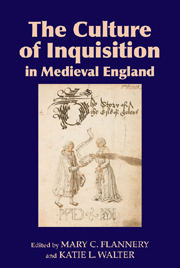Book contents
- Frontmatter
- Contents
- Illustrations
- List of Contributors
- Acknowledgements
- Abbreviations
- Introduction: Imagining Inquisition
- 1 Inquisition, Public Fame and Confession: General Rules and English Practice
- 2 The Imperatives of Denunciatio: Disclosing Others' Sins to Disciplinary Authorities
- 3 English Provincial Constitutions and Inquisition into Lollardy
- 4 The Contest over the Public Imagination of Inquisition, 1380–1430
- 5 ‘Vttirli Onknowe’? Modes of Inquiry and the Dynamics of Interiority in Vernacular Literature
- 6 From Defacement to Restoration: Inquisition, Confession and Thomas Usk's Appeal and Testament of Love
- 7 Confession, Inquisition and Exemplarity in The Erle of Tolous and Other Middle English Romances
- 8 Heresy Inquisition and Authorship, 1400–1560
- 9 Imitating Inquisition: Dialectical Bias in Protestant Prison Writings
- 10 Response Essay: Chaucer's Inquisition
- Bibliography
- Index
10 - Response Essay: Chaucer's Inquisition
Published online by Cambridge University Press: 05 April 2013
- Frontmatter
- Contents
- Illustrations
- List of Contributors
- Acknowledgements
- Abbreviations
- Introduction: Imagining Inquisition
- 1 Inquisition, Public Fame and Confession: General Rules and English Practice
- 2 The Imperatives of Denunciatio: Disclosing Others' Sins to Disciplinary Authorities
- 3 English Provincial Constitutions and Inquisition into Lollardy
- 4 The Contest over the Public Imagination of Inquisition, 1380–1430
- 5 ‘Vttirli Onknowe’? Modes of Inquiry and the Dynamics of Interiority in Vernacular Literature
- 6 From Defacement to Restoration: Inquisition, Confession and Thomas Usk's Appeal and Testament of Love
- 7 Confession, Inquisition and Exemplarity in The Erle of Tolous and Other Middle English Romances
- 8 Heresy Inquisition and Authorship, 1400–1560
- 9 Imitating Inquisition: Dialectical Bias in Protestant Prison Writings
- 10 Response Essay: Chaucer's Inquisition
- Bibliography
- Index
Summary
The question that drives The Culture of Inquisition is: what does inquisition have to do with imagination? This is not an easy question to answer, in part because modern assumptions about law and literature often get in the way. Like any legal procedure, inquisition relies on both repetition and enforcement, or, in other words, the idea that it can be performed the same way under a variety of circumstances for a long time to come. Though basic to law, this idea is sometimes conflated with bad practices associated with pre-modern inquisition, for example, coercion, torture and the persecution of minority beliefs. To put the problem a different way, modern writers tend to identify the sadistic or primitive qualities of pre-modern inquisition with an inflexibility or non-progressiveness in law. Human rights advocates, for example, will often call ‘medieval’ those (usually non-Western) legal practices they consider immoral, such as public flogging or trial without representation, regardless of whether these practices are medieval in origin. Conversely, literary critics often take the view that imaginative literature—even medieval literature—is modern by comparison to law insofar as it is capable of bringing about change, for example, by criticising abuses and injustice, or by subverting social norms.
- Type
- Chapter
- Information
- The Culture of Inquisition in Medieval England , pp. 164 - 172Publisher: Boydell & BrewerPrint publication year: 2013



